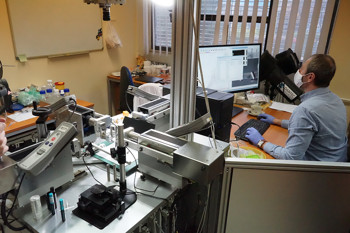Applied sciences in mechanical engineering
Tutor: Prof. Ing. Michael Valášek, DrSc.
Applied Sciences in Mechanical Engineering is a doctoral study programme built with regard to the needs of future employers and their demand for highly qualified professionals capable of conducting both basic and applied research and development, converting knowledge into reality. The industrial fields in focus are particularly those relying on advanced calculations, mathematical and computer modelling and simulations, controlled experiments, use of active controlled systems for the design of machines and installations, advanced materials and the related manufacturing technology, as well as on sustainable and safe production of electricity and other types of energy, industrial and environmental biotechnology, biomechanics, intelligent industrial systems built on advanced computing and more.

 The concept of the studies emphasizes scientific research and independent creative effort, taking into account strong interdisciplinary
links in modern mechanical engineering. The programme is conceived as a multidisciplinary one, overlapping with specific narrower
areas of applied mechanics, thermodynamics and fluid mechanics, mathematical and physical engineering, mechatronics or biomechanics.
The concept of the studies emphasizes scientific research and independent creative effort, taking into account strong interdisciplinary
links in modern mechanical engineering. The programme is conceived as a multidisciplinary one, overlapping with specific narrower
areas of applied mechanics, thermodynamics and fluid mechanics, mathematical and physical engineering, mechatronics or biomechanics.
The presented doctoral studies respond to the demand for professionals capable of understanding and developing increasingly complex production systems across industries (mechanical engineering, energetics, biotechnology, manufacturing, aviation and space technology) in a virtual world of computers, mathematical and computer models and simulations interlinked with the real world through controlled experiments. The complexity is increasing owing to extensive integration of supply chains, massively developing automation and robotization of processes, as well as their growing interconnections towards autonomous production systems employing advanced sensors to adaptively manage and optimize individual production processes on a real-time basis. Another important issue requiring response in the form of education is the introduction of numerous new materials (biomaterials, composites and plastics, materials with nanoparticle content) as well as new manufacturing technology, such as additive, controlled or IT-assisted, the mastering of which, along with the capacity for further development based on own research, is a prerequisite for consequent integration within intelligent manufacturing systems, modern IT, cybernetics and artificial intelligence.
The doctoral study programme aims at educating professionals having such knowledge and being capable of creating new original outcomes in R&D to turn such into commercial practice. Also, some of the programme graduates are expected to continue in the basic research of technical science and to support the Czech Republic’s international competitiveness in mechanical engineering and industry.
Graduate profile
 Applied Sciences in Mechanical Engineering graduates are capable of developing their knowledge of mechanical engineering and
carrying out research & development to consequently transfer the interdisciplinary insights to the industry, particularly
in applied science in mechanical engineering, which forms the basis of design, energy and process, material and production
engineering. Also, they are able to respond to current market needs in areas focused on intelligent industrial systems with
regard to the implementation of Industry 4.0, mechatronics, modern IT, artificial intelligence, additive technology, aviation
and space technology, modern industrial biotechnology and biomechanics.
Applied Sciences in Mechanical Engineering graduates are capable of developing their knowledge of mechanical engineering and
carrying out research & development to consequently transfer the interdisciplinary insights to the industry, particularly
in applied science in mechanical engineering, which forms the basis of design, energy and process, material and production
engineering. Also, they are able to respond to current market needs in areas focused on intelligent industrial systems with
regard to the implementation of Industry 4.0, mechatronics, modern IT, artificial intelligence, additive technology, aviation
and space technology, modern industrial biotechnology and biomechanics.
As part of mastering the key competences, they are able to develop and apply the gained knowledge and skills within a narrower professional focus. Thus, in advanced mechanical engineering they are able to push forward the traditional concept of calculations, modelling and experiments as well as modern areas emphasizing the use of IT, AI and machine learning to ensure the development of mechanical engineering knowledge for intelligent industrial systems in response to the key new technologies of Industry 4.0, such as mechatronics, internet informatics, additive technology, new materials, virtual and expanded reality or artificial intelligence. Theoretical background for the above skills is provided as part of the Applied Sciences in Mechanical Engineering competence covering the required knowledge of mathematical and physical engineering, mechanics, biomechanics, thermomechanics and fluid mechanics, technical cybernetics, material engineering, including the management and economics of the innovation lifecycle.
Doctoral graduates possess profound knowledge to complete the most challenging research tasks as well as experience with the latest mathematical, computing and experimental methods and world-class pilot and operating equipment. This allows them to tackle complex tasks in modelling and development of new technology and equipment on a theoretical level as well as to experimentally verify their conclusions by designing and realizing experimental equipment, conducting an evaluation and producing generalized results. Given the complexity of the latest technology that the education focuses on, emphasis is placed on strengthening the links among the particular areas of the doctoral study programme as well as on fostering interdisciplinary connections on the level of related fields. Relying on this knowledge, graduates are able to comprehensively solve, objectively evaluate and formulate the attained original results of scientific research assignments. Also, they are able to present or realize the same on an international scale, taking into account intellectual property issues. Programme graduates are suitable candidates for jobs in the field of basic research in technical science, industrial research and development, new technology design and implementation, and management of complex industrial systems. Other opportunities can be found in the academic sector and other institutions focused on science, R&D and innovations on the national and international level.
Admission requirements
- The fundamental condition for admission is a completed master’s degree in a field related to the thesis topic.
- Properly completed application form, submitted in due time and manner.
- Original of a proof of completed university education (i.e. diploma or diploma amendment), or a certified copy of the same, presented to the Science and Research Department of the Faculty of Mechanical Engineering of CTU, Prague.
- The entrance test is oral, mostly covering three subjects selected in a manner to allow the candidate to demonstrate knowledge of the theoretical basics of the doctoral study programme. The examination also includes oral verification of the candidate’s past professional activities, current level of language skills and orientation in the chosen thesis topic. Admission is based on a consensus of the examination board members as to whether the candidate has the capacity to successfully graduate and complete the thesis. Where multiple candidates apply for one announced topic, the board sets the order of successful applicants and recommends the first-ranking candidate for studies. As part of the admission examination and in accordance with the Study and Examination Rules, the tutor has the right to veto an admission decision in respect of a topic proposed by such tutor.
![[design/2014/cvut-logo-en-white.png]](https://fs.cvut.cz/content/images/design/2014/cvut-logo-en-white.png)
![[design/2014/cvut-logo-en-print.jpg]](https://fs.cvut.cz/content/images/design/2014/cvut-logo-en-print.jpg)